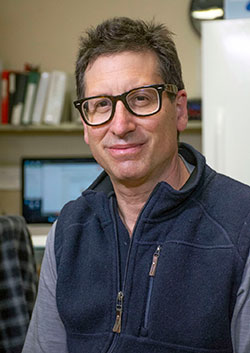
David Fay, a professor in the University of Wyoming Department of Molecular Biology, recently chaired a blue-ribbon advisory panel for the National Institutes of Health (NIH). The panel provided advice about how the NIH funds grant proposals.
The NIH’s Center for Scientific Review creates Evaluating Panel Quality in Review (ENQUIRE) panels to ensure that the NIH continues to identify and support high-impact, cutting-edge research. ENQUIRE panels for specific subject areas are assembled about once every eight years. Fay was asked to chair a panel last month that examined the organization of study sections in the areas of developmental and regenerative biology.
“The NIH is continually trying to update the panels that review grants,” Fay says. “This is done, in part, because science changes, fields grow and contract, and new areas are always emerging. So, definitions of topic areas that were relevant 10 years ago might not make as much sense today.”
The NIH looks for committee chairs with a strong background in grant review and leadership experience. Fay has served on dozens of study sections over the years and has reviewed several hundred grants during his career. He was instrumental in the creation of the UW Molecular and Cellular Life Sciences Ph.D. program and served as its director for a decade.
Fay also has served as associate director of Wyoming INBRE (IDeA Networks of Biomedical Research Excellence), a program project grant that is funded by the NIH. INBRE aims to help Wyoming build infrastructure for biomedical research and education. As associate director of INBRE, Fay works to support faculty, Ph.D. students and undergraduates in furthering their research goals.
Additionally, Fay is a productive scientist whose own research has been supported by competitive external grants since joining UW 23 years ago. He uses the nematode Caenorhabditis elegans, a nonparasitic roundworm, to investigate the function of genes common to humans and nematodes.
Fay’s research provides new avenues for examining human health problems. His current research on nematode genes has helped establish more information on how certain genes implicated in cancer are functioning. In some cases, studying nematode genes also may help identify new strategies to combat nematodes that parasitize humans, livestock and crops.
“With a distinguished career marked by many significant contributions to developmental and cell biology, Dr. Fay embodies the ideal qualities of a panel chair: deep scientific knowledge, a proven track record of insightful review and a commitment to fostering scientific innovation,” says Jay Gatlin, head of the UW Department of Molecular Biology.
About the University of Wyoming College of Agriculture, Life Sciences and Natural Resources
UW’s College of Agriculture, Life Sciences and Natural Resources is a beacon of academic excellence in agricultural and natural resource education. Committed to providing a comprehensive and interdisciplinary approach, the college prepares students to address real-world challenges. With renowned faculty guiding cutting-edge research and hands-on experiences, graduates are equipped with the skills to contribute significantly to agriculture, life sciences and the preservation of natural resources.

